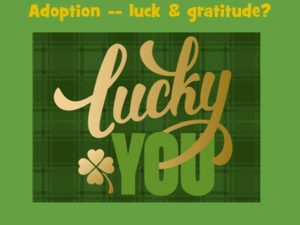Feeling short of time or finding it difficult to concentrate? You can listen to this post. Read time 6:25

During this month folks who are Irish–literally or metaphorically–celebrate St. Patrick’s Day. Like many holidays, a non-sectarian sense of fun has overtaken the religious aspects of the day’s origins. So what does St. Patrick’s Day have to do with adoption? The “luck of the Irish” comes to mind. Luck…a term easily tossed around. And often hurled in the face of adoptees. They routinely hear, “You are so lucky you were adopted.”
Regardless of the reasons that caused their adoption, the loss of their first family is significant, painful, tragic. Many have written eloquently on this absurd and painfully invalidating notion.
This expectation of gratitude is often coupled with equally offensive “Shoulds.” Adoptees are told they should:
- be happy they weren’t aborted,
- appreciate that they received a “better” family and/or a “better life
- quit whining about being adopted,
- relinquish any interest in and/or connection with their birth parents and first families, etc.
From the day our first child was placed in my arms thirty-five years ago, I believed I understood the tragedy at the roots of our joy. As the years have unfolded, however, I realize that the enormity of this life-long loss cannot be parsed by anyone who is not actually an adoptee or birth parent. When cancer destroyed my ability to conceive, no one ever suggested to fifteen-year-old me that I should feel lucky for having cancer or lucky for being rendered sterile. The very notion is ridiculous.
I did/do, however, frequently hear that I should feel grateful that I didn’t have to experience pregnancy or childbirth. I do not. I grieve that loss of not having that nine months of shared intimacy. Yes, it rearranged my life and ultimately led to my cherished children entering my life. But the benefits do not erase the losses; they coexist. Yet this expectation of gratitude for the cruel factors that shaped our lives is often flung in our faces. It feels deeply invalidating to have our personal tragedies dismissed as trivial or as a blessing. When we connect to our own individual experiences of painful incidents, we can glean a small appreciation for what our (adopted) children encounter. Still, we are adults and benefit from an adult’s perspective, experience, and skillsets to help us cope. So how do we best support our children and free them from the crushing weight of such societal expectations?
Most of us–unless we ourselves are also adopted–cannot truly understand their emotional reality. The closest we can come is probably connecting to our own infertility losses, miscarriages, or stillbirths, etc. and imagining how we would feel if people regularly expected us to be grateful. We ache when we’re told how lucky we are to have avoided the discomfort of pregnancy or when we hear, after a miscarriage, that we’ll probably conceive another. I suspect most of us have felt gut-punched by such callous remarks. I believe it is hard for people to see their loved ones and friends suffer. They feel discomforted by our pain or struggle. For their sake as well as ours, they seek a quick resolution. However, moving too quickly to fix-it mode ignores the genuine reality of the pain of the present moment. It must be worked through not denied.
To some extent, I suppose we can appreciate such emotional hand grenades as it is a way of nurturing empathy for our children’s plight. Like our children, we too, hold a Both/And reality with our own emotions because while adoption provided us our children to love and graft into our families it did not cure infertility or cause us to forget our stillborn babies or the monthly rollercoaster of grief when pregnancy failed to happen. We must resist the need to apply emotional band-aids and instead to sit with them offering empathy, validation, and a safe harbor in which they can be 100% honest about any pain and angst they feel about adoption. This kind of presence, compassionate witness, and honesty are at the heart of Adoption Attunement.
Intentional families are lucky in one way: we exist in a level of awareness committed to thinking deeply about our choices, language, methods, and emotions and therefore, raise our consciousness to a level often missed by those who operate on auto-pilot because life rocked us out of our comfort zone and into a world of hard-won empathy. What will you do this week to reshape the connection between luck, gratitude, and adoption?
___________________________
- Call us at 1-800-653-9445
- Listen to our podcasts: Adoption Matters: Real People. Real Life. Real Talk and Essentials of Adoption Attuned Parenting
- Watch our YouTube channel
- Read Books written by our coaches
- Click to learn more about Adoption Attuned Certified coaching!


